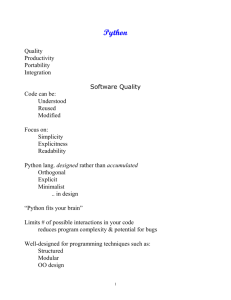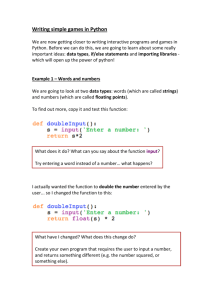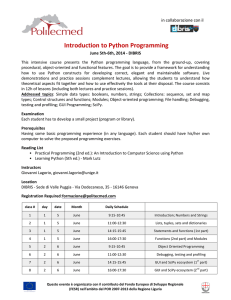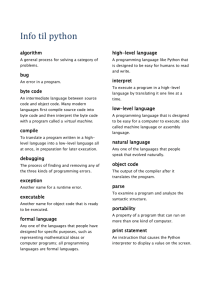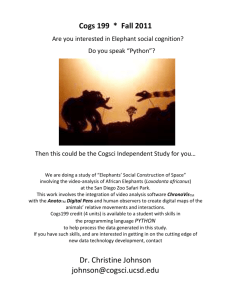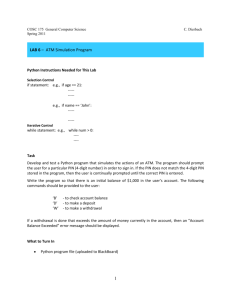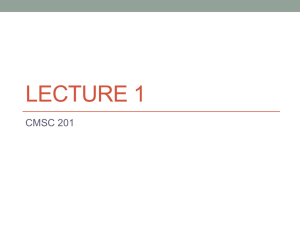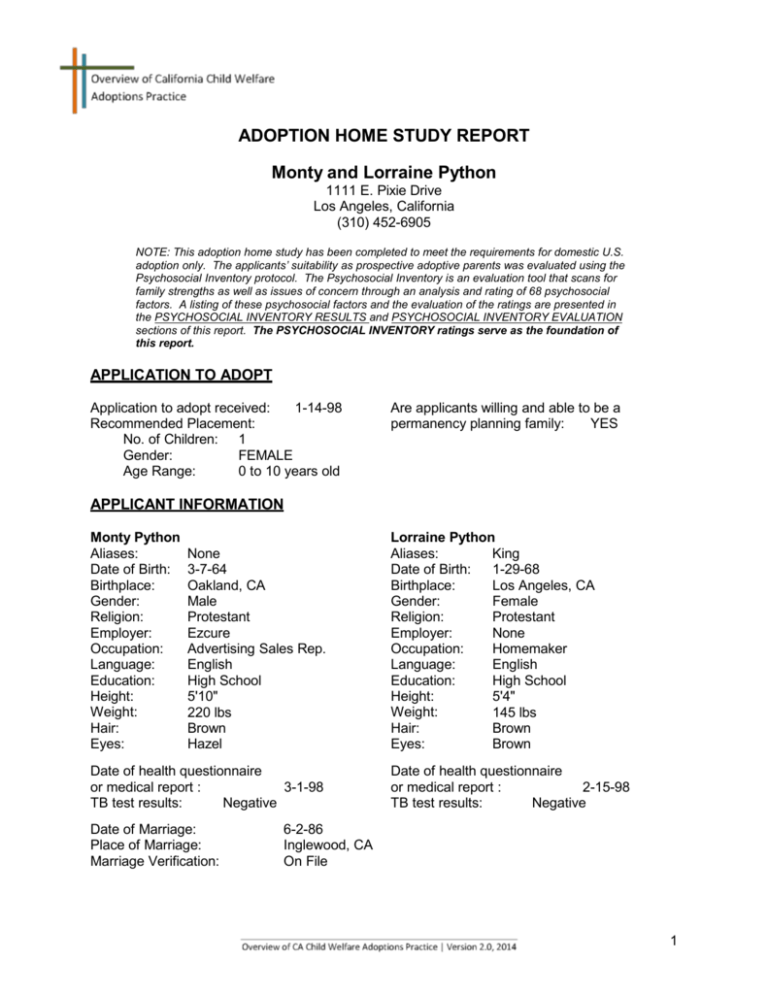
ADOPTION HOME STUDY REPORT
Monty and Lorraine Python
1111 E. Pixie Drive
Los Angeles, California
(310) 452-6905
NOTE: This adoption home study has been completed to meet the requirements for domestic U.S.
adoption only. The applicants’ suitability as prospective adoptive parents was evaluated using the
Psychosocial Inventory protocol. The Psychosocial Inventory is an evaluation tool that scans for
family strengths as well as issues of concern through an analysis and rating of 68 psychosocial
factors. A listing of these psychosocial factors and the evaluation of the ratings are presented in
the PSYCHOSOCIAL INVENTORY RESULTS and PSYCHOSOCIAL INVENTORY EVALUATION
sections of this report. The PSYCHOSOCIAL INVENTORY ratings serve as the foundation of
this report.
APPLICATION TO ADOPT
Application to adopt received:
1-14-98
Recommended Placement:
No. of Children: 1
Gender:
FEMALE
Age Range:
0 to 10 years old
Are applicants willing and able to be a
permanency planning family:
YES
APPLICANT INFORMATION
Monty Python
Aliases:
Date of Birth:
Birthplace:
Gender:
Religion:
Employer:
Occupation:
Language:
Education:
Height:
Weight:
Hair:
Eyes:
None
3-7-64
Oakland, CA
Male
Protestant
Ezcure
Advertising Sales Rep.
English
High School
5'10"
220 lbs
Brown
Hazel
Date of health questionnaire
or medical report :
3-1-98
TB test results:
Negative
Date of Marriage:
Place of Marriage:
Marriage Verification:
Lorraine Python
Aliases:
King
Date of Birth:
1-29-68
Birthplace:
Los Angeles, CA
Gender:
Female
Religion:
Protestant
Employer:
None
Occupation:
Homemaker
Language:
English
Education:
High School
Height:
5'4"
Weight:
145 lbs
Hair:
Brown
Eyes:
Brown
Date of health questionnaire
or medical report :
2-15-98
TB test results:
Negative
6-2-86
Inglewood, CA
On File
1
DATES OF CONTACT
(Listed below are the dates of individual/couple interviews with each applicant and
any other child or adult in the home.)
Date(s)
2-5-98
2-22-98
3-31-98
3-14-98
3-14-98
Individual/Couple
Joint Interview with Mr. and Mrs. Python
Individual with Mr. Python
Individual with Mrs. Python
Joint interview with Mr. and Mrs. Python
Individual interviews with Jonathon, David,
and Lisa Python
Location
Python home
Agency office
Agency office
Python home
Python home
MOTIVATION TO ADOPT
The Pythons report they have a very stable and loving home life and enjoy raising their
two sons. They would love to have a daughter and feel they have much to offer
another child. The Python's believe at this stage in their lives, increasing their family
through adoption is the best way.
HOME ENVIRONMENT
Type of residence: house
Bedrooms: four
Bathrooms: two
Length of time in current residence: five years
The Python's live in a quiet residential neighborhood in the city of Los Angeles. The
block is tree-lined and not overly burdened with parked cars. By appearance, their
neighbors give the same care and attention to their individual homes as the Python's. It
is not a busy, traffic street nor is it far from necessities such as grocery stores, health
care facilities, and bigger shopping centers. Parks, theaters, and other entertainment
options are also easily within driving distance from the Python home.
The home was assessed for health and safety hazards. This assessment included a
walk-through of both the interior and exterior of the home and was completed on
March 14, 1998. The Python's home has neither a pool nor spa. They also do not own
nor store guns within their home environment. Their home appears free from obvious
safety hazards such as overloaded power outlets or excessive use of extention cords.
The Python's keep their medicine in a cabinet and cleaning agents stored in the laundry
room and under the kitchen sink. They are aware and prepared to add additional safety
measures such as locking cleaning agents and medicine or covering outlets should they
be placed with a younger child.
FAMILY
2
Previous adoptions: The Python's have not previously adopted.
Children in the home: Jonathan is the Python's oldest son. At 14 years of age, he
presents as healthy and currently pleased with life. He is very involved in school, both
in athletics and academics. Jonathan consistently gets good grades and reports that
school comes easily to him. He wants to go to college and is focused on getting into
UCLA. He likes computers and reportedly has to be torn away from his PC. He loves
to play soccer and has been playing most of his life. He thinks his parents adopting a
girl is "cool".
David is the Python's only other child. He is 13 years old. David is healthy and has
never had any serious medical problems although he is susceptable to colds and
allergies. David does well in school but admits it takes more effort on his part than it
does for his brother. David also enjoys playing soccer and indicated that he is a better
player than his brother. David enjoys watching TV and hanging out with his brother and
other friends. He likes being outdoors and loves computer games. David says getting
a sister is "no big deal" and that it is "OK" with him.
Other adults in the home: Lisa Python is the younger sister of Mrs. Python. She
presents as well-mannered and positively interested in the fact that her sister wants to
adopt. She reports living with her sister is a temporary arrangement. She moved in
about 6 months ago just prior to starting school. Lisa is currently taking a computer
training course and already has options for employment. Her plans are to take a
vacation prior to starting her new job. This should all be completed within the next few
months. She understands that if a child is placed sooner, she may have to make other
arrangements and is prepared to do so.
Applicants’ minor/adult children living outside the home: None
Family lifestyle: The Python's lead a busy and structured lifestyle. All family members
have busy schedules during the week with school, work, appointments, and activities.
They make a point of coming together for dinner which Lorraine enjoys cooking. If it's
not school and work then it is soccer that keeps them busy. This is truly a "soccer
family." They travel with their league and attend all games. They have developed an
"extended family" relationship with the other soccer player's families.
Mr. Python works long hours but he is usually home most nights and weekends. When
they can, the family enjoys outdoor activities such as camping, fishing, and hiking.
They also enjoy renting movies and going to see soccer, hockey, and basketball
games. They live a rather traditional lifestyle in which Lorraine is mainly responsible for
the inside of the house and Monty the outside. All family members have their assigned
responsibilities with regard to keeping the house running. On the weekends, they eat
their meals together as a family and are not so structured that they don't each have
enough "private time." They get together with relatives on holidays and special
occasions and it ususally occurs in their home.
3
APPLICANT - Monty Python
Monty is a confident man who presents himself in an informal and outgoing manner.
He is engaging and easy to talk to. He is clearly goal-oriented when it comes to his
career and loves to talk about "business." He enjoys his work in sales stating it allows
him to meet many people and it constantly offers him opportunities for advancement.
Mr. Python enjoys all spectator sports although he does not participate in many physical
activites. He enjoys fishing and camping with his family and participates in his children's
activities as much as possible.
Mr. Python's parents, John and Mary Python, currently reside in Riverside, California.
They are both retired but maintain good health and active lifestyles. Mr. Python is the
middle of three children. Bill, his older brother, is in law enforcement. He is married
and living in Riverside with his wife and three daughters. Greg, Monty's youngest
brother, also works in sales. He lives in the San Diego area with his wife and young
son.
Mr. Python was married once before to Betsy Miller. They were married in 1983 and
divorced exactly one year later.
APPLICANT – Lorraine Python
Lorraine is a soft-spoken woman who is friendly and engaging once she is comfortable.
She enjoys cooking and is quite skilled in the art. When not focusing on her family,
Mrs. Python's creative side surfaces. Lorraine is artistic and displays her abilities by
making jewelry, pottery, flower arrangements, and wreaths. She likes to garden and
the family home reflects her interests. Overall, being a homemaker is what interests
Mrs. Python most; raising two children and running a home keeps her very busy.
Lorraine's parents, Jim and Faye King, are both healthy and living a retired lifestyle in
Orange, California. Lorraine has two brothers and two sisters. Her brother Sam lives in
San Diego. He is single and works for Wal-Mart. Ted, her youngest brother, lives in
Tucson, Arizona. He is in the Air Force and currently single. Lorraine's sister Helen is
married and has one daughter. Helen's family also lives in Orange. Lisa, her youngest
sister is single and currently residing with the Python's.
Mrs. Python has no previous marriages.
CRIMINAL/CHILD ABUSE RECORD
The required criminal record and Child Abuse Index checks were completed for the
applicants and Mrs. Python's younger sister, Lisa.
4
California Department of Justice findings: No history of arrest or convictions for
Monty, Lorraine, or Lisa.
Child Abuse Index check findings: No findings for Monty, Lorraine or Lisa.
Other findings: The DMV records did not reveal any driving citations for Monty,
Lorraine, or Lisa.
FINANCES
Combined annual gross earned income:
$54,000
Sources of Additional Income: None
CHILD CARE PLAN
Childcare: Mrs. Python does not work outside the home and provides consistent care
for the children.
Long-Term Substitute Child Care: Mrs. Python's sister, Helen, and her husband
Larry, have been identified as the individuals who will provide long-term care in the
event of an incapacitating illness or death. Helen and Larry are close to the Python
family and have strong relationships with Jonathan and David.
Helen and David are very supportive of the Python's adopting and are committed to
being responsible in the future for this child as well. This family is reported to be more
than able to provide for the Python children should the need arise. They are currently
raising a daughter and have no plans to have other children of their own. This
arrangement has not been formalized through a will, though the family intends to do so
once they complete the adoption.
POST FINALIZATION CONTACT
Mr. and Mrs. Python state they are "open" to discussing the possibility of birth parent,
however, they remain apprehensive and hope contact is not an issue for the child once
placed. They are clearly more open to contact with previous caretakers or extended
relatives such as grandparents or sibings. They have been advised of PostAdoption
Contact Agreements and state they would be willing to discuss this in the future.
REFERENCES
Three required references have been received. All references were from individuals
who have known the Python's from five to ten years. All responses were positive
regarding the Python's and their family. They were described as hardworking, involved,
and caring parents who have done a great job with their two children and
5
"unquestionably" will do a good job with another. Additional descriptions provided were
"responsible", "happy", "supportive", "friendly", "helpful", and "loving."
FAMILY PREPARATION AND TRAINING ACTIVITIES
Mr. and Mrs. Python participated in a seven-week MAPP preparation course offered
through the agency. They attended all sessions and willingly participated in the group
process with ten other couples. Mr. Python stated the experience was "enlightening"
and Mrs. Python responded that her new found knowledge regarding the adoption of
special needs children was "overwhelming". They clearly benefited from group
participation and positively connected with quite a few of the other group members.
They enjoyed the learning process and acknowledged they knew very little about
adoption or caring for children with special needs. The session on "gains and losses"
and "discipline" were the most meaningful for both. Their ability to empathize with
children and their extended families who are involved in protective services clearly
increased over the seven-week period. They became less critical and more
understanding of birth parents and their various circumstances, and became less fearful
at the thought of maintaining birth family connections.
LEGAL/FINANCIAL RIGHTS AND RESPONSIBILITES
Monty and Lorraine Python have been provided with information concerning the legal
and financial rights and responsibilities of adoptive parents and the differences inherent
in an adoptive parenting relationship. They understand that they will be accepting full
legal and financial responsibility for the child(ren) they adopt.
They have been informed and provided with written information about the Adoptions
Assistance Program (AAP), as well as been informed about the agency adoption fee.
The applicants will be applying for AAP and it is recommended that the adoption fee be
waived.
The agency’s grievance review hearing procedures were explained to the applicants.
6
PSYCHOSOCIAL INVENTORY RESULTS:
(NOTE: The following is a list of the Psychosocial Inventory sections and
the factors evaluated within each section. Check all factors that were given a rating of 3, 4, or 5. Factors left unchecked
correspond to a given rating of 1 or 2.)
HISTORY
APPLICANT’S CHILDHOOD
CHILDHOOD HISTORY OF PHYSICAL ABUSE
CHILDHOOD HISTORY OF SEXUAL ABUSE
HISTORY OF SUBSTANCE ABUSE
HISTORY OF VIOLENT ACTS
HISTORY OF BEING AN ADULT VICTIM
OCCUPATIONAL HISTORY
PSYCHIATRIC HISTORY
CRIMINAL/CHILD ABUSE HISTORY
MARRIAGE/DOMESTIC PARTNER HISTORY
PERSONAL CHARACTERISTICS
COMPREHENSION
COMMITMENT AND RESPONSIBILITY
PROBLEM SOLVING
INTERPERSONAL RELATIONS
HEALTH AND PHYSICAL CONDITION
SELF-ESTEEM
ACCEPTANCE OF DIFFERENCES
DEPENDENCE AND INDEPENDENCE
IMPULSE CONTROL
MOOD
ANGER MANAGEMENT AND RESOLUTION
JUDGMENT
FLEXIBILITY
MARITAL/DOMESTIC PARTNER RELATIONSHIP
CONFLICT RESOLUTION
EMOTIONAL SUPPORT
ATTITUDE TOWARD SPOUSE/PARTNER
COMMUNICATION
BALANCE OF POWER
STABILITY OF THE MARRIAGE OR PARTNERSHIP
SEXUAL COMPATIBILITY
PARENT/CHILD RELATIONSHIPS
CHILDREN IN THE HOME
CHILDREN OUT OF THE HOME
ADULT SONS AND DAUGHTERS
PHYSICAL/SOCIAL ENVIRONMENT
CLEANLINESS/ORDERLINESS/MAINTENANCE
HEALTH AND SAFETY OF HOME ENVIRONMENT
FURNISHINGS
PLAY AREA, EQUIPMENT, & CLOTHING
FINANCES
OTHER ADULTS IN THE HOME
SUPPORT SYSTEM
GENERAL PARENTING
CHILD DEVELOPMENT
PHYSICAL DISCIPLINE
DISCIPLINARY METHODS
CHILD SUPERVISION
LEARNING EXPERIENCES
PARENTAL ROLE
CHILD INTERACTIONS
COMMUNICATION WITH CHILD
BASIC CARE
CHILD’S PLAY
SPECIALIZED PARENTING
EXPECTATIONS
EFFECTS OF ABUSE/NEGLECT
EFFECTS OF SEXUAL ABUSE
EFFECTS OF SEPARATION AND LOSS
STRUCTURE
THERAPEUTIC/EDUCATIONAL RESOURCES
BIRTH SIBLING RELATIONSHIPS
CHILD BACKGROUND INFORMATION
BIRTH PARENT ISSUES
CROSS-CULTURAL ISSUES
ADOPTION ISSUES
INFERTILITY
TELLING CHILD ABOUT ADOPTION
OPENNESS IN ADOPTION
ADOPTIVE PARENT STATUS
EXTENDED FAMILY RELATIONSHIPS
EXTENDED FAMILY COHESION
EXTENDED FAMILY ADAPTABILITY
RELATIONSHIP WITH OWN EXTENDED FAMILY
RELATIONSHIP WITH SPOUSE/PARTNER’S FAMILY
7
PSYCHOSOCIAL INVENTORY EVALUATION
(Note: The following narration contains a description
and evaluation of the family’s strengths and issues of concern as identified in each Psychosocial Inventory section.
The evaluation of any issue of concern may include the applicants’ perception of and efforts to resolve the issue,
mitigating family strengths and the resources and/or services needed or used.)
History
Two factors, Applicant Childhood and Childhood History of Physical Abuse, were
identified as issues of concern for Mr. Python in this section. Both centered on Mr.
Python's relationship with his father. Mr. Python indicated that his father was an overly
critical, emotionally distant, punitive man who frequently drank too much and spent a lot
of time at work. Mr. Python's father would periodically use corporal punishment
(spanked with his hand on the buttocks) that bordered on physical abuse even though it
was not perceived as such by either of Mr. Python's parents. This would usually occur
when his father had a little too much to drink, something he usually did on Saturday
nights. While the several instances of harsh corporal punishment were very unpleasant
events for Mr. Python as a child, he does not remember being afraid of his father or
traumatized by the severity of the punishment. Mr. Python also remembers his mother
being his major source of support during his childhood, which offset the negative
experiences he endured with his father. He truly believes his father loved him,
explaining that his father, when not drinking, always tried to make amends for his
behaviors when he was. As an adult, Mr. Python has developed a good understanding
of the issues his father was struggling with at the time. He believes his parents
complimented each other and together were able to provide adequate nurturing,
guidance, and stability to meet Mr. Python's physical and emotional developmental
needs.
Mr. Python has no history of substance abuse nor violent acts aside from periodically
yelling and swearing. He does drink on occasion but always in moderation. He has a
very stable work history and while his job in sales is stressful, he has been very
successful and appears to enjoy the competitive nature of his profession. Neither
Mr. Python nor any of his own extended family have a history of a psychiatric condition.
Mr. Python had a short-lived first marriage that lasted approximately one year. He was
a 19-year old newlywed and became a 20-year old divorcee. He and Betsy were young
and self-centered and really didn't know each other too long before they married. They
argued over everything and never found a comfortable base from which to grow. They
have no contact at this time; Monty heard Betsy moved away and went back to school.
He states they were not able to remain on friendly terms since their divorce. Monty
recalls how this first experience actually made him better prepared for his marriage to
Lorraine, in that he clearly knew he wanted to be married and have children. Monty
learned he had to make some behavioral changes such as being less self-centered and
more patient. Basically, his first marital experience gave him some insight for his
second.
There were no issues of concern identified in this section for Mrs. Python.
Mrs. Python's parents had a solid marriage and raised her in a very traditional manner.
Her father was hard working but emotionally distant. Her mother was a "stay-at-home
mom" who was nurturing and supportive. Her parents provided her with a safe and
stable childhood experience free from abuse in which her physical and emotional
developmental needs were well met.
Mrs. Python has no criminal or psychiatric experiences and has always related in her
present manner, being neither a victim nor victimizer of others. Mrs. Python has no
history of substance abuse and has never worked outside of the home. She left her
parents home when she married Monty and made the choice of raising a family her
primary focus. Mrs. Python sees much of her mother in herself and this pleases her.
Personal Characteristics
Four factors for Mr. Python and one for Mrs. Python were identified as issues of
concern in this section. The issues were Health and Physical Condition, Acceptance of
Differences, Mood, Anger Management and Resolution, and Dependence and
Independence.
Health and Physical Condition: Mr. Python, though physically healthy, reports to suffer
from allergies and at times, insomnia. He states the insomnia occurs when he is very
stressed from work. It is not a chronic problem and generally does not prevent him
from getting enough sleep to function. Mr. Python's own assessment reflects a lack of
physical activity which continues to decrease with age. He is certainly not pleased with
this stating it makes him feel old. To his credit, Mr. Python has already begun a
jogging program and is now running three times a week.
Acceptance of Differences: Mr. Python has not had much exposure to individuals from
diverse backgrounds. He functions in a very homogeneous environment that
perpetuates a good deal of stereotypic thinking. For example, Mr. Python indicated he
would not be comfortable if his child's teacher was homosexual. In discussing this
issue with Mr. Python he was very receptive and non-defensive. He is open to learning
and can acknowledge that his beliefs in many instances are based on a lack of
knowledge. The prognosis for growth in this area is excellent.
Anger Management and Resolution: The Python's agree that Mr. Python tends to bring
work problems home and belabors them. He can be short-tempered and quick to anger
on issues related to work and home. In these instances, he will rant and rave over trivial
matters such as his son David forgetting to take out the garbage or a minor
disagreement with Lorraine. When he displays these behaviors, the family tends to
"walks on their toes." Mr. Python states that when he has these tantrums, he eventually
realizes the effect and leaves the house to calm down. The family has adjusted to
Monty's outbursts and they no longer feel threatened by his anger. They've come to
realize his anger does not lead to violent behavior and do not feel physically threatened
in any way. Mr. Python realizes his behavior doesn't really solve anything. The
Python's report a better ability to assess these situations when they arise, and as a
result see a decrease in their occurance.
Mood: This issue in many respects is directly related to Mr. Python's temper outbusts.
Mr. Python acknowledges that he is very hard on himself and that he tends to become
overly serious and unable to easily relax and let go if things are not going as well as he
expects. These are times when he is irritable and tense and clearly in a bad mood.
Mr. Python has good insight into all four of these issues which supports a high
probability for positive change. He is engaged in learning more about diversity, has
begun to focus on his physical conditioning, and is very motivated to get at the root of
his anger. He has taken anger management classes at his local community college. It
is also important to view these issues in the context of Mr. Python's positive
characteristics. He is a very bright, responsible man with excellent interpersonal skills
and problem solving abilities. He is confident in his abilities, uses good judgement, and
adapts well to change.
There was only one issue of concern, Dependence and Independence, identified for
Mrs. Python in this section. The Python's have established traditional roles within their
family in which they both benefit from their individual strength with Monty being the
provider and Lorraine being the caretaker. This arrangement has not provided Mrs.
Python with many experiences outside the home that would help her develop more
confidence in functioning under circumstances that dictate she assume an independent
role. Consequently, she is uncomfortable under such circumstances and will usually
abdicate such roles to Mr. Python or insist that he join with her to deal with the situation.
As with Mr. Python, Mrs. Python is able to acknowledge this tendency to avoid
situations that demand independent functioning. She perceives it as an issue she
should address and is willing to take steps toward improvement in this area. Aside from
this one issue, Mrs. Python possesses very positive personal characteristics. She is a
very bright, perceptive, and responsible woman. Mrs. Python has a few long
established friendships from her school years. Though she appears somewhat isolated
from establishing outside connections due to being a homemaker, her ability to relate to
others is reflected in her healthy relationships with her family and her increasing positive
involvement with the parents of her son's soccer teammates. Mrs. Python is in
good health and active with her children. She maintains a good attitude towards her life
and gains much positive self-regard through her role as wife and mother.
Mrs. Python is much more accepting of differences than her husband and is beginning
to help him learn more about diversity. She uses good judgment and presents no
problems around impulse control. Mrs. Python is a very compassionate person who is
quick to forgive. She manages her anger appropriately. Lorraine rarely gets upset
although she becomes a little testy when someone devalues the role of a stay-at-home
mom. She is usually very positive, friendly, and has a great sense of humor. Mrs.
Python adapts easily to new situations and is able to shift gears and juggle several
things at one time.
Marital/Domestic Partner Relationship
Three factors were identified as issues of concern for the Python's in this section. They
were Conflict Resolution, Emotional Support and Balance of Power. The Python's 15
year marriage without separation or divorce certainly defines their union as being
stable. Mr. and Mrs. Python are deeply committed to making their marriage work and
readily admit it is not always an easy path to follow. They have been observed and
reported to be a loving couple who are attentive and respectful of each other yet they
acknowledge they have regular disagreements which they would describe as "fights."
These fights are usually over the same issues. Mr. Python feels like he is not getting
enough attention and Mrs. Python feels like she often carries more than her share of
the responsibility. They both agree their intimate sexual relationship is mutually
satisfying but add they would like to increase their opportunities of intimacy.
The Python's have insight into their behaviors and realize they often blame the other for
their own feelings and situation. Although they do argue, it never gets out of control or
violent. They usually separate and cool off and then come back together better
prepared to handle things. The Pythons don't let problems linger. They realize this is
not healthy for their marriage nor for their children and acknowledge they have been
working addressing issues as they arise. Arguments still occur though they have
lessened over time. Monty realizes that Lorraine is better at compromising than he. He
understands this imbalance is not healthy, and realizes this dynamic was a pattern he
had in his first marriage. Monty is working on this and Lorraine reports a noticeable
increase in his ability to be flexible and compromising.
Parent/Child Relationships
Mr. and Mrs. Python present with many strengths in parenting Jonathan and David.
Mrs. Python is a very involved parent. Her relationship with her sons was described
and observed to be fairly balanced between being a loving, attentive parent and one
who allows both her children a level of independence and privacy. Her availability to
her sons doesn't appear to be smothering and meets each child's individual needs
appropriately. She's very tuned-in to both her son's moods, manners, and personality
styles. She reports that so far the "adolescent" stage has not been difficult with either
of her sons and states her availability, and and their involvement in other interests, has
been a major contributing factor.
A strong, loving mutual attachment exists between Mr. Python and his sons even
though his work responsibilities often limits his availability to them. They relate with
much humor and share common interests. Mr. Python keeps involved with his children
through Mrs. Python when his work gets in the way. The boys look forward to times
spent with their father.
Consideration was given to Jonathan and David when the Python's were deciding to
submit an application to adopt. It was a decision equally supported by all family
members. Jonathan was easy to engage and feels at his age getting another sibling is
more exciting than threatening; he likes the idea of having a "little sister." David has a
similar attitude believing that his new sister will probably be much younger than he.
They were observed to have a healthy way of relating and seem close. They will clearly
enjoy having a younger sister and will function well with their "older brother" status. The
fact the Python's want to adopt a girl younger than their sons, in combination with their
sons' current developmental stage (increasing their independence), support the
probability that the boys adjustment to another sibling will be a positive and healthy
experience for all. They have been educated to what adoption means and harbor few
fantasies that it will always be fun.
Extended Family Relationships
One factor, Relationship with Spouse/Partner's Family, was identified as an issue of
concern in this section. Generally, the Python family functions in a healthy manner.
Individual relationships are close and supportive with mutual respect and acceptance
being the norm. They appear to respond to changes without difficulty and are able to
adapt to the individual needs of family members, although the relationship between
Mr. and Mrs. Python, their own fathers, and their respective fathers-in-law remains
somewhat problematic. Mrs. Python reports that her father has never fully accepted her
husband. Similarly, Mr. Python's relationship with his own father has prevented the
development of a comfortable relationship between Mrs. Python and her father-in-law.
The relationship between Mr. and Mrs. Python and their respective fathers-in-law can
be characterized as emotionally distant, and occasionally argumentative. The Pythons
agree that Lorraine makes more of an attempt at a healthier relationship with her fatherin-law than Monty does with his. Mr. Python states that as long as they get along on a
superficial level, at least the potential for a stronger connection exists. Despite these
difficulties, both "grandfathers' relationships with their grandsons have never been
affected, and in fact, have flourished.
All family members have been advised of Monty and Lorraine's efforts toward adoption.
Positive responses were received and there remains constant interest in the process,
requirements, and possibility of placement happening soon. Lisa Python is a healthy
and energetic individual very much in support of her sister adopting. She would love to
be an "aunt" to a niece, as she is to her nephews. Observed interactions reflect that
she is very close to her nephews and sincere in her feelings. Lisa was cooperative and
eager in her participation in the home study process. She is definitely supportive and
very excited about the adoption.
Physical/Social Environment
One factor, Support System, was identified as an issue of concern in this section. Mr.
and Mrs. Python have healthy, mutually supportive relationships with both their
perspective families. All family members would be available to provide concrete
support for the Pythons if geographically practical. Mr. Python's family members live in
the Riverside and San Diego areas. Mrs. Python's family members live in the Orange
and San Diego county areas and her brother lives further away in Arizona. At this time,
it is a benefit that Lisa, Mrs. Python's sister, lives with them. Her presence gives them
the ability to be a little more flexible and even plan time for each other. Though this
arrangement is temporary, the Python's report it feels extremely supportive to be given
some free time to spend together.
The Python home is comfortable, appealing, and child focused. Their home looks
"lived-in", inviting, and reflects healthy but not neurotic housekeeping standards. There
are no "off limit" areas for any family member and one senses the home environment is
respected by all who reside there. The living space the home provides is more than
sufficient for the family and does not present a problem should they increase their
family size by adopting one child. At present the boys each have their own room and
Lisa Python is residing in the fourth. Once they adopt, this is the room their new child
will have.
General Parenting
The Python's present with many strengths in this area and have consistently
demonstrated a strong ability to provide for their two sons. Their ability to provide a
structured, loving, and nurturing environment is reflected in both their sons' current
positive status. Jonathan and David are well-adjusted children with likeable
personalities. They perform well in school, are involved in community activities, and
enjoy many friendships. Both parents are involved in their children's lives although
Mr. Python will readily admit that much of the credit for how his children are progressing
belongs to Mrs. Python. Observed interactions between Jonathan, David, and their
parents were warm, comfortable, and filled with humor.
The Python's closely supervise their children. They know their son's activities and who
their friends are. They are united in how they discipline their children. Neither child is
considered a disciplinary problem yet when discipline is required, the Python's rely on
natural consequences and removal of privileges. Both tactics are reported to work well
with their sons. The Python's have never used corporal punishment in disciplining their
children. They are theoretically opposed to this especially given their own childhood
experiences.
Specialized Parenting
Five factors were identified as issues of concern in this section. They are the following:
Effects of Abuse/Neglect, Effects of Sexual Abuse, Child Background Information, Birth
Parent Issues, and Cross Cultural Issues.
Effects of Abuse/Neglect: This factor predominately reflects a lack of knowedge and
experience in dealing with these issues. Although the Python's are excellent parents,
they have never parented a child whose had these experiences. The Python's were
attentive learners in the MAPP group and during all meetings with this social worker.
Although the Python's admit they don't really know how capable they will be until they
are actually dealing with a particular child's needs, they do acknowledge they moved
away from the "love will solve everything" attitude they now see they had when they first
came to the agency. They acknowledge, however, they still have much to learn.
Effects of Sexual Abuse: Though the Python's are now aware the agency can never
guarantee that a child placed in their care did not have a sexual abuse experience at
some time in their past, they are still convinced they cannot willingly choose to parent a
child with such a background. Mrs. Python, who is the primary caretaker, given Mr.
Python's work demands, strongly states she doesn't trust she will ever be sufficiently
skilled to meet the needs of a sexually abused child. She readily admits she would be
very concerned for the safety of her family given some of the acting-out behaviors one
could expect. Both Monty and Lorraine made a responsible self-assessment of their
abilities and feelings on this issue. Their sincerity and concerns regarding their inability
to meet such a child's needs reflect their awakening knowledge of what it would take to
do it right. Their insecurities on this matter would only be alleviated through experience.
Should a child be placed in their care and eventually demonstrate such issues, there is
little doubt this family would address the child's needs in a capable manner. The
Python's have demonstrated the ability to be flexible and strive to meet the needs of all
family members. Their adopted child would benefit from the same.
Child Background Information and Birth Parent Issues: The Python's struggled with and
developed the most insight regarding these two factors. They never knew the
importance of addressing these issues, focusing only on the anticipated placement and
future of their family with an adopted child. Opening themselves to these concepts was
at times difficult. It was the opposite of their understanding of "secrecy" and "moving
forward" being in the best interest of a child. Though not yet completely comfortable,
the Python's should be able to follow agency directives. They present as trusting of
agency policy, accepting of alternative views regarding birth parent issues, and
sincerely more empathetic towards birth parents in general. The Python's comfort level
will likely increase through the actual experience.
Cross-cultural Issues: The Python family admittedly does not live a culturally diverse
experience. Though they are accepting of children from all cultures being placed with
them, their ability to provide for a child with different racial and cultural needs is at this
time limited. They are very willing to educate themselves to the issues related to raising
a child of another culture though their current community does not provide much
diversity and they will find difficulty connecting their child to culturally appropriate role
models. This suggests they will have difficulty identifying themselves as a multiracial/cultural family after placement. The Python's are not resistant to making changes
and continually display a willingness to learn the necessary skills to adequately provide
for a child. The Python's sincerity to learn what is best for their children supports a
prognosis for positive change in this area. As in other areas, the Python's were eager to
discuss, debate, and listen to issues involved in parenting children of different
backgrounds. Their learning experience was supplemented by applicable reading
materials and a referral to an existing support group for families who have adopted
children from other cultures.
Adoption Issues
One factor, Openness in Adoption, was identified as an issue of concern in this section.
Infertility is not an issue for this couple. Mr. and Mrs. Python began their efforts toward
adoption understanding only that they wanted to parent another child and believing they
would be good parents given their continued success raising Jonathan and David. The
Python's responded that they would tell their child about the adoption when they
believed she would be old enough to understand. They had no solid response when
asked exactly when they thought that would be. Lorraine thought it would be best
before she entered school. Monty thought they should wait until she got older.
Discussions reflected the couple's fears and lack of knowledge as to how a child's
adoption status might effect both the child and the family. The couple initially presented
as if they would not address this issue with their child.
Participation in the MAPP group process introduced them to issues specific to adoption,
and other point of views and experience regarding talking about adoption. This helped
to educate the Pythons and reduce their apprehensiveness. Their sincerity in accepting
a better way of handling the "telling" is reflected in the numerous discussions they
initiated with this social worker regarding ways to approach the process, as well as
dealing with their feelings. They also clearly read the materials provided regarding
talking about adoption as this too generated much discussion.
The Pythons did not develop as solid a comfort level regarding openess in adoption as
they did regarding talking about adoption. Though they became less critical of birth
parents and their circumstances, the Python's still somewhat suspect that birth
parent/birth family contact could serve more to upset the child and cause problems for
their family. Their positive statements regarding support of their child "searching" in the
future reflects more their comfort that it is so far in the future, they really don't have to
worry about it now. Open and honest discussions regarding their views, my direct
observations, and interactions with the Python's strongly support their ability to change
and accept that their preconceived ideas are not set in stone. The Python's have
demonstrated an ability to gain insight and understanding regarding adoption issues
and will likely continue in this manner. Given they have less fears regarding birth
grandparents or former foster parents, it is highly likely they will adapt to a comfortable
acceptance of birth parents once the situation is no longer abstract.
The Python's appreciation for the importance of birth sibling contact is supported by the
close relationship their sons display and their understanding of what it means to them.
In addition, the Python's have clearly demonstrated their ability to adapt to the individual
needs of their children and will most likely respond to another child's needs in the same
fashion. The likelihood of the Python's having a child placed who has some type of
family contact will also support their ability to see the benefits such contact could
provide to their child and encourage its' continuance. The Python's have been
educated to the benefits past connections could provide. They learned in MAPP that
losses in adoption are many and decreasing the losses for a child leads to a healthier
experience and an easier transition. The Python's are eager to become adoptive
parents and look forward to its responsibilities and challenges.
CONCLUSIONS
Mr. and Mrs. Python are bright and perceptive individuals who make being responsible
look easy. The health of their marriage, the insight into their problems, and the fact that
their children present as well-adjusted support that existing problems in this family are
manageable and non-threatening to the security of their marriage and children.
Observations, school reports, and strong, supportive reference letters all reflect the
Python's qualified skills in raising and interacting with children. Raising Jonathan and
David has given the Python's a good understanding of childhood developmental stages.
Furthermore, their ability to provide a structured environment and ability to learn how to
meet an individual child's needs, support the Python's will maintain realistic
expectations of their adoption experience and effectively handle whatever challenges
may surface. The Python's generally function very well independent of outside supports
minimizing any difficulty of not having immediate concrete support available to them.
Mrs. Python being a stay-at-home mom is a significant factor. The family home
environment is safe and secure and their finances are stable and sufficient. The family
is establishing friendly, mutually supportive relationships with the parents of their son's
soccer team mates demonstrated by the fact they've been able to organize afternoon
stay overs for the kids giving each other welcomed "time off." The Python family
presents with multiple strengths to meet the challenges of parenting through adoption.
Lorraine and Monty Python's decision to adopt was well-thought out prior to submitting
their application. A strong ability to increase their knowledge and develop skills
pertinent to adopting a special needs child was evident throughout the home study
process. The couple consistently presented with an ease and eagerness toward
learning. Their open and honest manner supported a positive experience and beneficial
results. They own their insecurities and have a healthy commitment to
improving circumstances for themselves and their family. They have good insight and a
realization that a healthy family life requires much effort to achieve and even more to
maintain. The relationship struggles that exist for this couple faint by comparison to
their demonstrated ability to provide a safe, structured, and nurturing home environment
for their children and this increases the probability they will provide the same
for another child.
CHILDREN FAMILY CAN BEST SERVE
Monty and Lorraine Python would make excellent parents to a little girl. They are open
to a wide age range prefering this child to be younger than their youngest son who is 13
years old. The Python's have the skills to adopt more than one child but their finances
and physical space prevent this from being acceptable to them. The Python's will do
best with a child who will eventually grow to be independent and self-sufficient. They
are open and capable of handling most situations but believe they would not be the
best option for a child requiring excessive medical or psychological attention. They will
not adopt a child with a known history of sexual abuse or sexual acting out behaviors.
The difficulty of raising a child with such needs is more than they feel prepared or
qualified to handle and this social worker respects their decision.
RECOMMENDATION
It is recommended the application for adoption submitted by Monty and Lorraine Python
be approved.
John Worker
Adoption Social Worker
Jane Super
Adoption Supervisor
DATE:
DATE:
LIST ADDITIONAL ATTACHMENTS AS NECESSARY
RECEIPT OF COPY OF ADOPTIVE HOME STUDY REPORT
By signing below I acknowledge receiving a copy of this report.
APPLICANT NAME
APPLICANT NAME
DATE:
DATE:

